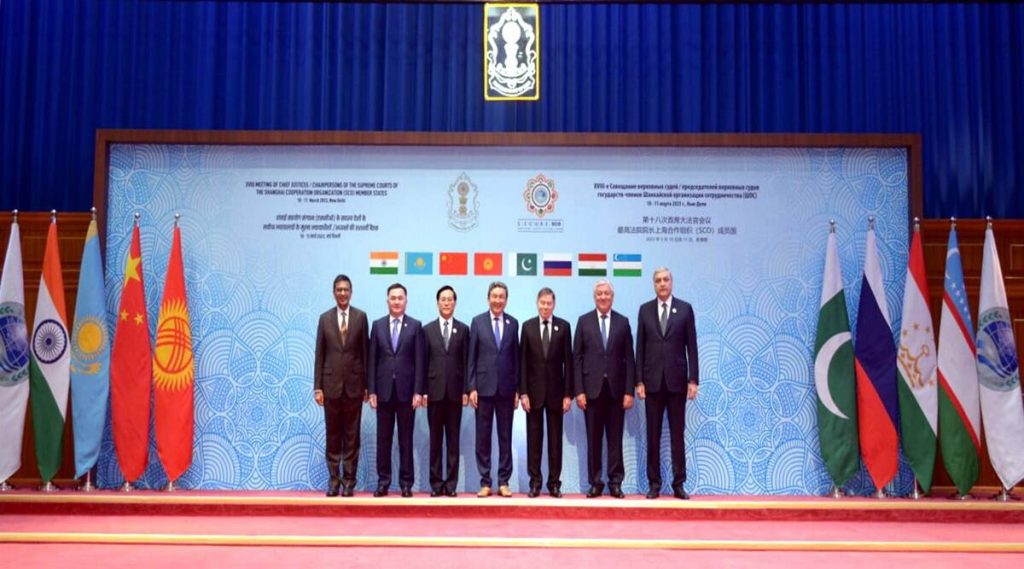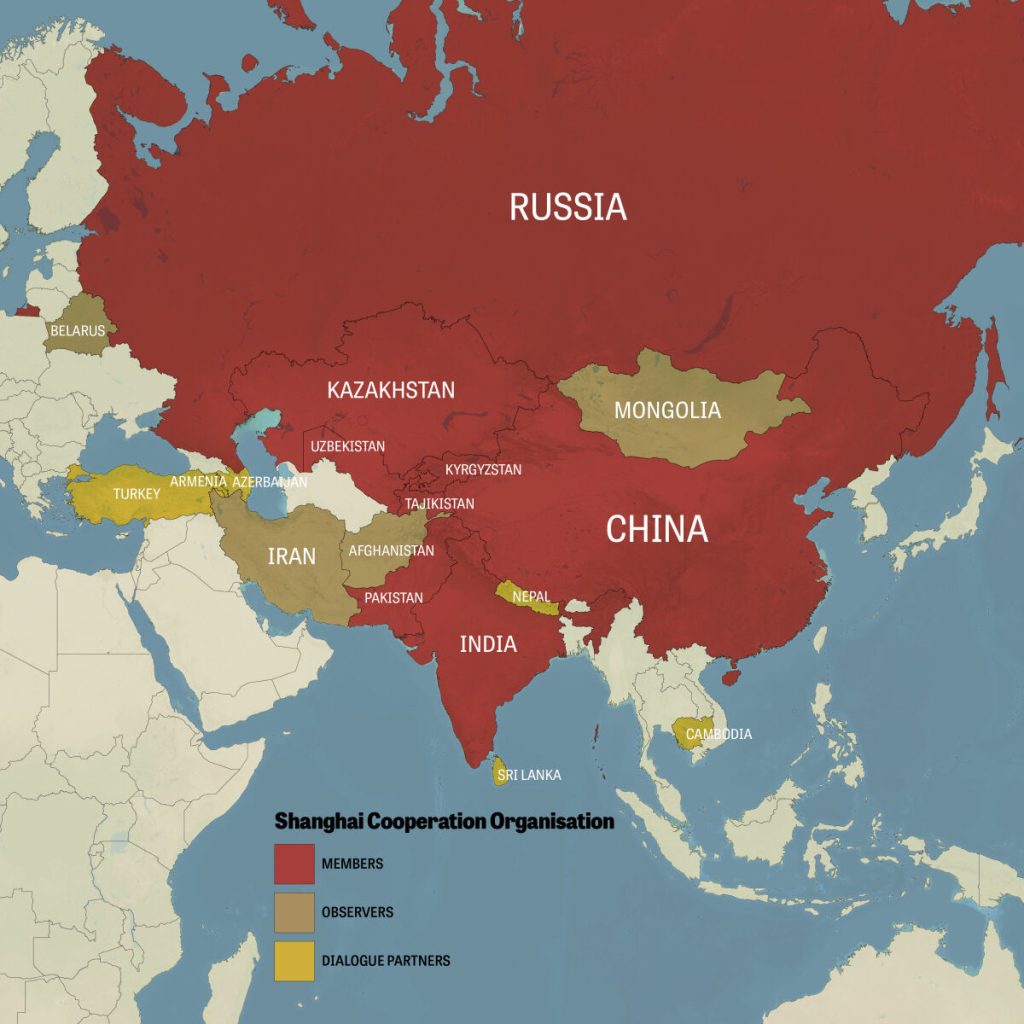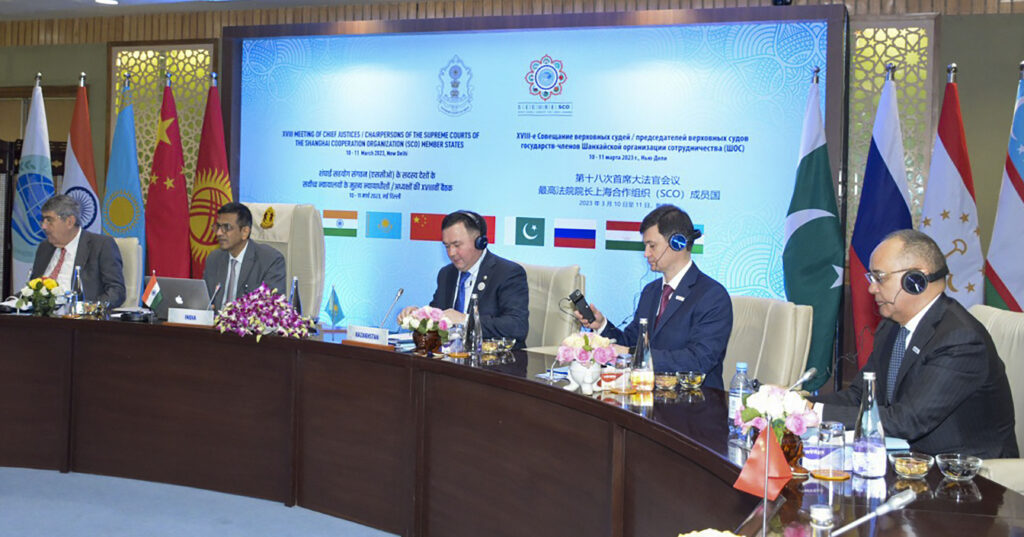The two-day conference attended by representatives of every SCO member state outside Pakistan, as well as the SCO Regional Anti-Terrorism Structure (RATS), the SCO Secretariat, and two observer nations, the Islamic Republic of Iran and the Republic of Belarus. Pakistan participated via videoconference.
The Shanghai Cooperation Organization (SCO) member states have urged to work towards judicial collaboration in order to make the legal system more accessible to the general public by Chief Justice of India D Y Chandrachud.
The CJI highlighted “the necessity for jointly adopting innovative procedures to make judicial processes easier and accessible” at the end of the 18th meeting of the Chief Justices/Chairpersons of the Supreme Courts of the member nations on Saturday.
The meeting “enabled all member and observer governments to reflect upon the difficulties that are common to their jurisdictions,” he said, highlighting a number of issues that the judicial systems of SCO member states are now confronting. “Emphasised that these concerns need to solved with mutual collaboration and by sharing experiences and insights collected,” said CJI Chandrachud.

The two-day conference attended by representatives of every SCO member state outside Pakistan, as well as the SCO Regional Anti-Terrorism Structure (RATS), the SCO Secretariat, and two observer nations, the Islamic Republic of Iran and the Republic of Belarus. Pakistan participated via videoconference.
According to an official statement, the conference’s first day, which began on March 10, featured a Joint Interaction Session where attendees talked about the difficulties they had and the precautions they took during the Covid-19 epidemic.
CJI Chandrachud said :
On day two of the conference, debates on “smart courts” and the future of the legal system took place. CJI Chandrachud stated that technology must used to close the gap between the public and the justice system. And shared recent initiatives taken by the Supreme Court of India, including the introduction of an electronic version of Supreme Court reports, the live transcription of court proceedings using artificial intelligence, and the translation of judgements into numerous regional languages, among others.
Other speakers at the event, in addition to CJI Chandrachud, included Aslambek Mergaliyev, Chairman of the Supreme Court of the Republic of Kazakhstan, Jinghong Gao, Vice-President of the Supreme People’s Court of the People’s Republic of China, Zamirbek Bazarbekov, Chairman of the Supreme Court of the Kyrgyz Republic, Umar Ata Bandial, Chief Justice, Pakistan, Vyacheslav M. Lebedev, Chief
The Republic of Kazakhstan has created new software post-Covid-19 to improve the accessibility of the electronic system used in judicial services, according to Nail Akhmetzakirov, director of the Court Administration of the Republic of Kazakhstan.
Shanghai Cooperation Organisation :
The Shanghai Five—the People’s Republic of China, Kazakhstan, Kyrgyzstan, Russia, and Tajikistan—were replaced by the SCO in 1996. The presidents of these countries plus Uzbekistan gathered in Shanghai on June 15. To announce the formation of a new organisation with a focus on increased political and economic cooperation. The SCO Charter was signed on July 7 and went into effect on September 19, 2003. Since then, eight states have joined, with Pakistan and India joining on June 9, 2017. A number of nations are participating as observers or discussion partners.
The Heads of State Council (HSC), the SCO’s top decision-making body, convenes once a year to oversee the organisation.

The establishment of modern public judicial services with inclusiveness, equity, convenience, efficiency, intelligence. Accuracy was crucial for the development of the judiciary. According to Xiaochen Qiann, Chief Judge of the Supreme People’s Court of the People’s Republic of China. He emphasised that the overburden of court work. The scarcity of judicial resources are global issues that must be addressed on a national and SCO-wide level.
The Chief Justice of the Supreme Court of the Russian Federation, Vyacheslav M. Lebedev, emphasised that a number of laws have been put in place to protect citizens, including the system of claims. Which allows plaintiffs to file claims at their residence, allows for remote participation in court proceedings. Sends SMS notifications regarding the date, time, and location of trials, and makes information about the court’s operations available.
Speaking on the topic of “Institutional Issues Facing the Judiciary: Delays, Infrastructure, Representation, and Transparency,” Justice K. M. Joseph emphasised the problem of a large case backlog. The requirement for proper infrastructural facilities as a method of gaining access to justice.

